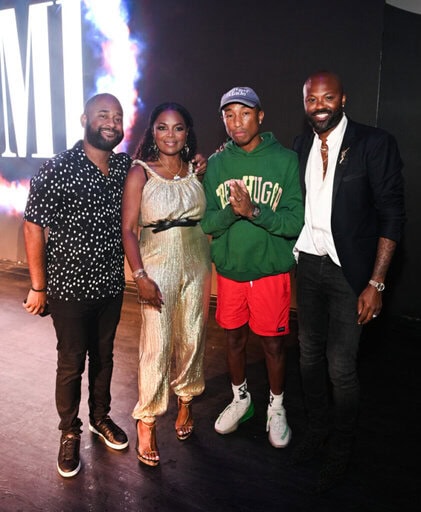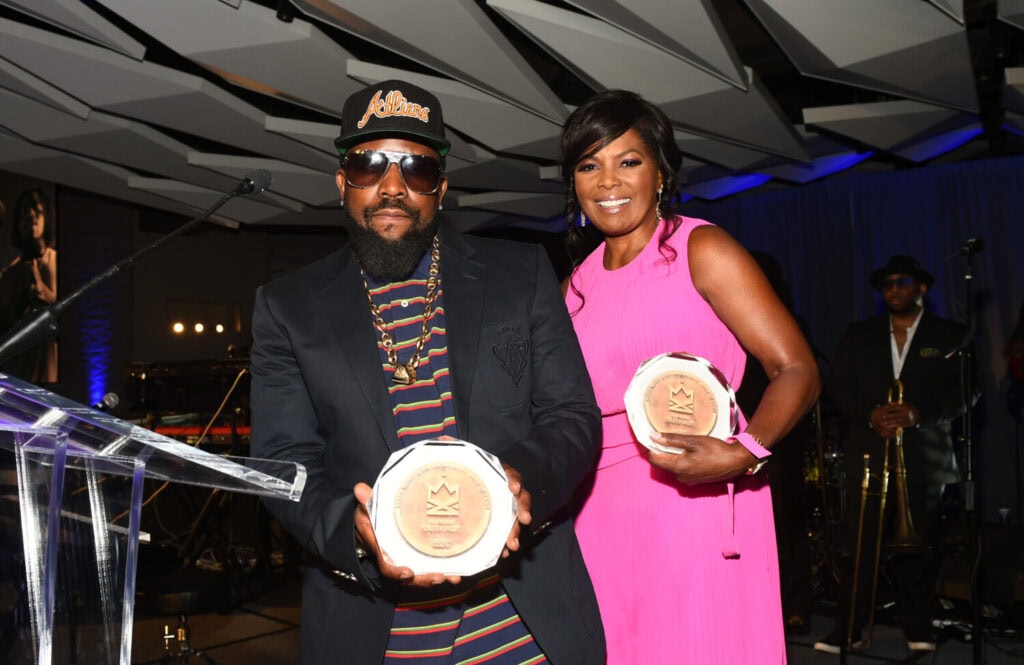From Drake to Outkast, the BMI executive has worked with some of the most iconic acts in the history of hip-hop. Boardroom sat down with her for an exclusive conversation.
Catherine Brewton is no stranger to the hip-hop game.
After a first career as an industry executive with GE, Brewton moved to Atlanta to embark on a career in music, which has led her to work side-by-side with some of the biggest names in the business. From Drake to DJ Khaled, Pharrell to Outkast, Brewton has been a key player in the evolution of the iconic Atlanta sound.
Throughout her career, she has served as a champion of new talent and a connector of opportunities. She has become an industry icon since joining BMI in 1997, receiving Billboard’s Woman of the Year honors in 2022.
Boardroom’s D’Shonda Brown sat down with the VP of Creative to discuss her journey to and through the industry, the core role that women play in the history of hip-hop, and much more.
This interview has been edited for length and clarity.
D’Shonda Brown: How would you explain your role as VP of Creative to someone who may not know exactly what it is that you do?

Catherine Brewton: We see people early. I saw Pharrell before Pharrell was really Pharrell. I signed the whole Cash Money group. I remember in 1997 going to New Orleans. You know, certainly not necessarily being a real versed hip-hop girl, and meeting Lil Wayne at 14 and signing him at 16. And, you know, the rest is history.
So much about what we do is really early on seeing creatives — mostly writers, producers — who in a lot of cases are artists as well. So many of these guys I’ve become friends with in their early evolution of their career and just really connecting the dots, allowing them to meet other creatives in the early stages of their career.
DB: Can you give us a little walkthrough or a map of your career and how you landed at BMI?
CB: What’s so fortunate is I didn’t necessarily aspire to work in the music business. I was a business executive at GE. I had the opportunity to move and run a credit center in Jacksonville, FL. Not sexy. I was like, ‘oh, I don’t know that I wanna do that.’ (laughs)
So I decided to move to Atlanta, and my lawyer’s like, ‘hey, the Grammys are looking to open an Atlanta chapter.’ And I was hired to open the Atlanta chapter of the Recording Academy.
My lawyer also repped the senior VP at BMI, who I was hired by, and the president at the Grammys.
DB: How have you personally seen hip-hop evolve since you began in the music industry?
CB: That’s a loaded one. You know, what was fun for me, I think I was such a newbie. My mom is a pastor, so I didn’t necessarily grow up listening to hip-hop, but I was always such a fan of the art and all that hip-hop brought to our culture.
Coming up, I came up with the Pharrells and Cash Money. I signed Outkast. So many of those guys were, in my mind, the blueprint [for hip-hop] in Georgia. And then I became super close to Snoop, and then I signed The Game.
There was this whole wave that although they were different in some respects, the nucleus of it all was about storytelling. And I think nineties hip-hop will always be near and dear to me in the core of what I so love.
I was talking to Luda recently who’s now not only one of the most iconic hip-hop guys in this market, but now a very successful actor. And he’s like, ‘I’m working on some new stuff, Kat. I need you to hook me up with the next greatest new.’ And so we are having these dialogues, and that’s really been the genesis of my career.
All of these things and hip-hop become so much of a change.
We’ve seen this latest wave. I think Future was that bridge … He set the tone for what’s now this whole new wave. It’s been sustained because I think kids have a different capacity and a different feel for what hip-hop is. But if you look at what’s happening, a lot of 90s music is being sampled by this new wave.
So what does that tell you? That that era of music, it was just melodic and that wave intertwined throughout hip-hop.

DB: And what specifically does the 50th year of hip-hop mean for women in the music industry?
CB: I think what it meant for me, and what I think it means to me is that we’ve been such important figures. But I think when the stories are being told, it’s always from a male perspective. What I know having been in this seat for over 20 years is a lot of what was done in terms of making sure that things financially could happen and giving advice to people.
Women have been the lifeline for so long, even though we’ve not been the most public. [We’re] behind the scenes. We kept many lights on in many respects.
I saw Drake in the height of his career at BMI with the mixtape that almost put me outta the business because it was such a crazy flurry around Drake. That was a real badge of honor for me because everybody and their brother was trying to sign him.
It sometimes goes beyond business because I care about the creatives and I always wanna be the voice of reason. And that’s been my mainstay, I think, in hip-hop and in the culture. I’ve been true to the game in every sense of the word.
DB: How did your experience at Shaw University prepare you for your experience in the industry?
CB: I don’t know that I even understood what that meant to me in the time that I was there. So coming out of it, then going into GE, and then at BMI. I did a women in business program at Harvard. It so made me appreciate my cultural experience at Shaw.
I did the commencement service in 2016 or 2017, which was really special to me to be able to go back and share my story and my success with kids. I think now kids are going to HBCUs because they now see the value in us being in our own communities, cultivating our own relationships, and then being released to the world to be great.
I appreciate the experience, probably now more than I did at the time.
DB: Tell me about how you’ve seen gender dynamics play a role in your career and how you’ve seen women come into positions of power over the years in the entertainment industry.
CB: There are several dynamics. I think post COVID and the Black Lives Matters movement, I think women still struggled. Women still were not sufficiently represented in C-Suites.
I think we still have work to do. I think we have to be intentional about giving access to our young Black brothers and sisters, and when we’re in positions where we are hiring, and when we are in positions where we have voices.
I’m proud that during the Black Lives Matters movement, I led a four month DEI group that we hired someone that’s of color, a black woman who is extraordinary. I think BMI has done an incredible job really trying to give access and create platforms for more people of color to advance through the ranks.
We’re making strides, but I think, is it enough? No, because there’s not enough black women in the C-suite and senior level positions.
DB: Why is it important to include black women, whether it’s rappers or executives in the C-Suite, in conversations about hip-hop’s anniversary and hip-hop in the future?
CB: We are the voice. How do you not talk about it? The Monie Loves and MC Light and Queen Latifah. Lil’ Kim, Nikki Minaj now.
We are still in every room. We’re in every space in some capacity, but when the story’s being told you have to include women, because whether we’re known or not, we’ve been a thread in the whole journey of hip-hop.
It wouldn’t be the same if it wasn’t for women, whether again, on screen or behind the scenes who have been super impactful.
DB: How do you balance a career as VP, being a producer, and being a philanthropist, and how do you make sure that you give 100% to everything that you do without burning out?
CB: I think women are built differently (laughs). I think by nature, because we’ve had to be so many things in so many situations.
I look at my mom and my mom was the greatest woman ever to live for me. I learned early through a tragic situation of losing my father, she left the community and then went back to buy up the block in every sense of the word.
I’m actually gonna be shooting a documentary about her story — what I watched, her pain and suffering, and then going back and saving other lives.
So I lean into someone who is an example. Everybody’s not gonna have that example, but when we find the person that really provides a conduit for us to see a different way or to lean into things that sometimes don’t feel like it’s right, I think about those who have gone before us who have had much, much more difficult struggles.